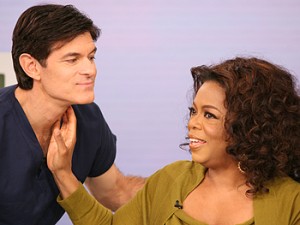Dr Oz’s Life Saving Heart Tips

Start By Knowing Your Resting Pulse
 I WANT to relate something important that I just saw on the new Dr. Oz Show.
I WANT to relate something important that I just saw on the new Dr. Oz Show.
For those of you unfamiliar with the good doctor, Mehmet Oz is a heart surgeon, author and peripatetic dispenser of health information made pretty famous by appearing 55 times on the Oprah Winfrey Show. Now he has his own, co-produced by Winfrey’s Harpo Productions and Sony Pictures Television.
I’ve seen him numerous times in several venues and find that he has a knack for simplifying complex health issues, and for suggesting simple things to do to avert, or cope with potentially major health problems.
Which brings me to the topic at hand, the heart.
Dr. Oz says that for most of us, we first find out we have a heart problem when that magnificent organ goes rogue and has an attack. Not a good time to be alerted about your cardiovascular problem.
How to get a clue before it’s too late? Get focused on your pulse.
Your pulse is a window into the health of your heart. Dr. Oz recommends that if you are in the high risk category for cardiovascular disease — you’re overweight, have high cholesterol, high blood pressure, are sedentary, experience shortness of breath doing simple physical activities — you should check your pulse in bed each morning before you launch into your day .
Dr. Oz instructs that you measure your pulse, which mirrors your heat beat, by taking two finger of one hand and applying them to the wrist of the other hand below the and wrist under the thumb, as the picture shows.
I have an easier time measuring my pulse by placing two fingers to either side of my throat, like Oprah is doing in the picture above. For me, it’s easier to find the pulse and it feels stronger, as in more prominent, or obvious.
In either case, as you watch a clock or watch tick off six seconds, count the beats of your pulse and then multiple the number you count by ten. This gives you the beats per minute, which is how the pulse rate is calibrated.
If your pulse exceeds 75 beats per minute when you’ve just awakened and are still in bed, your chances for a heart attack increase if you’re in the high risk category, says Oz.
If that’s the case — your pulse is over 75 and stays there — I’d pick up the phone and call a doctor for instructions before I’d begin jumping rope.
Dr. Oz ends this segment on his show by suggesting that there are some helpful, if not sufficient, things you can do to help your heart, along with the typical bromides of a better diet and exercise, and these are:
– Take 1,000 milligrams of Vitamin D. It has a knack for distributing calcium to your bones instead of your heart and arteries, a signal to heart attack risk.
– Take aspirin daily. It thins the blood and reduces inflammation in the arteries.
For more about heart care centered around vitamin supplementation, check out this post, The Heart of the Matter.
Last Updated on February 23, 2021 by Joe Garma


